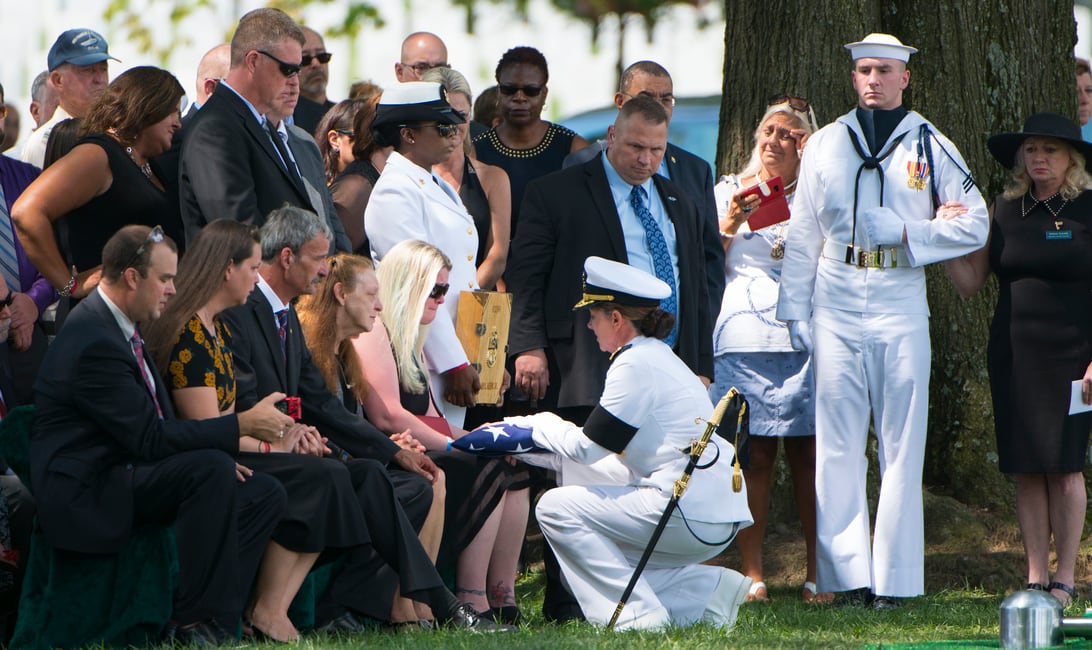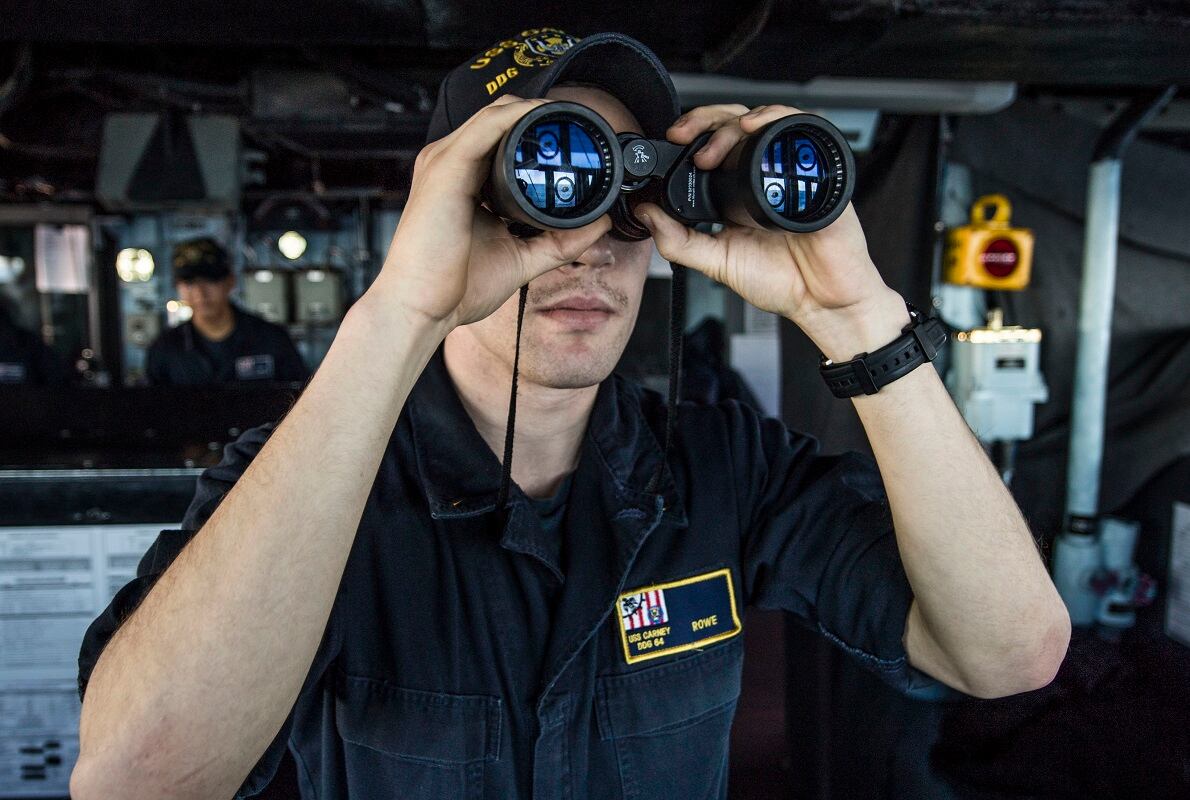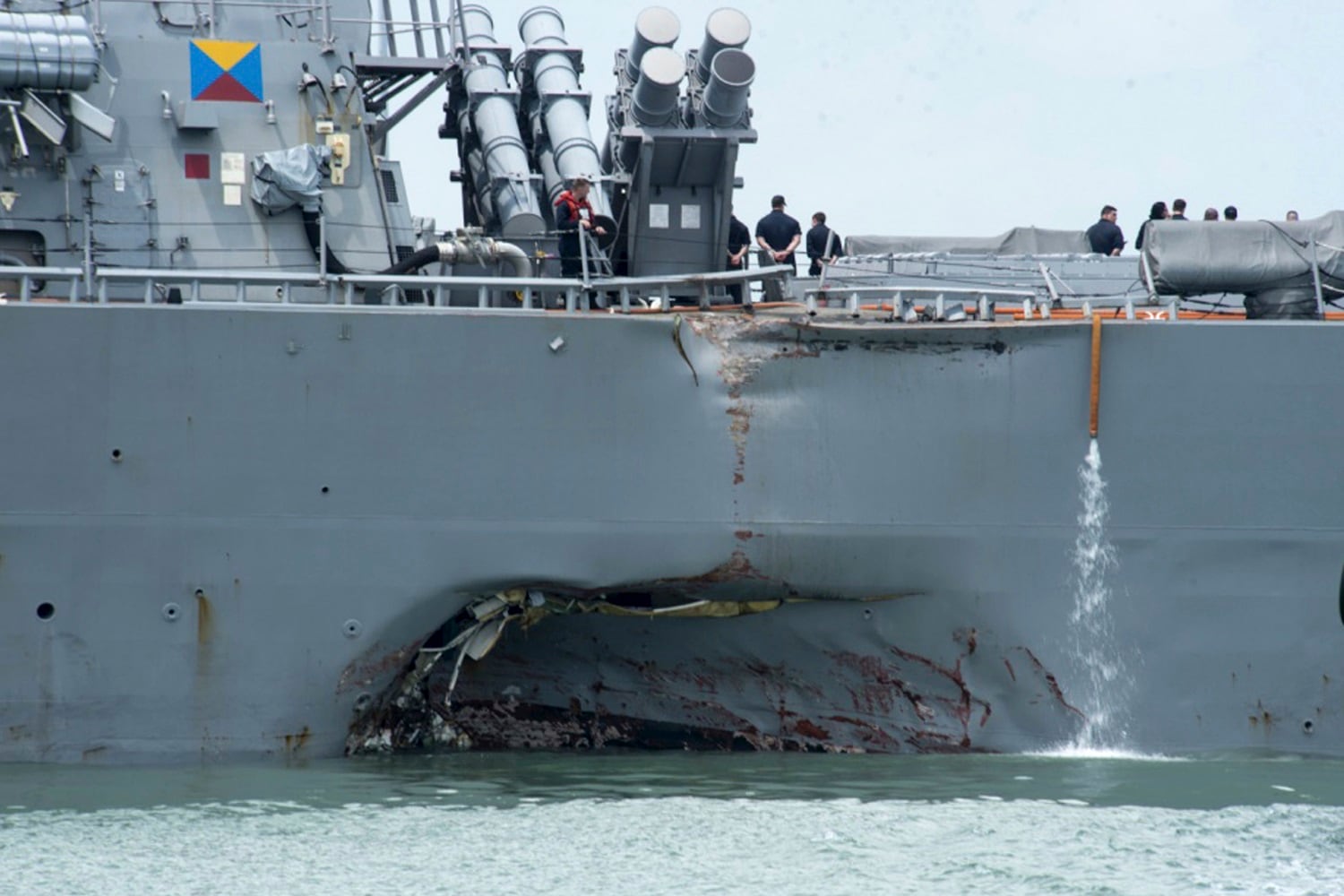While the Navy has invested heavily in ship-driving training in the wake of two fatal collisions in 2017, surface warfare officer test scores haven’t improved and officials still can’t track whether safety reforms are working, according to a federal government watchdog report released Thursday.
“It is concerning that SWO competency has not improved in the 2 years since the 2017 collisions despite the fleet-wide attention to improving ship-driving skills,” the Government Accountability Office report stated.
The sea service also has not broadly surveyed SWOs for feedback on the reforms or created standards to determine when an officer can be qualified as a SWO, investigators wrote.
“Division Officers reported being qualified as Officers of the Deck without ever having stood watch at sea, with the Commanding Officer granting qualifications based on their classroom and simulator experience alone,” GAO found.
TO GAO, “ship-driving" encompasses all the skills needed to direct a crew to safely navigate and handle a ship during a wide variety of situations.
The Navy has long sought to create SWOs who are competent at navigation, seamanship and ship handling, including understanding the steering and sailing rules for preventing collisions at sea, shipboard damage control and calculating relative motion between maneuvering ships.
RELATED

Some commanding officers, executive officers and department heads reported that they have had to teach skills like ship-driving in congested waterways that should be instilled during formal SWO training.
GAO also found that some SWO students who just completed classes outperformed seasoned SWOs with more than a year at sea.
Monitoring and adjusting systemic reform efforts were pillars of a “Comprehensive Review” of the surface fleet after 17 sailors died on board the guided-missile destroyers Fitzgerald and John S. McCain in the summer of 2017.
“Without addressing these challenges, the Navy cannot assess in the near term if the significant investments made to expand and enhance SWO ship-driving training are effective,” investigators wrote.
Senior Navy leaders told investigators “it could take 16 years or more to know if the planned changes to SWO training were effective.”
The GAO report revealed that ship-driving test scores among SWOs have not improved in recent years, despite reform efforts.
Such “spot-check” assessments were given to 164 SWOs who had recently qualified as Officers of the Deck, or OODs, in early 2018. The results showed that more than 80 percent of the SWOs displayed problems driving a ship.
“As of July 2019, the Navy had assessed 38 SWOs from three courses and found that the proficiency level of the SWOs assessed had not improved from the proficiency levels seen in the 2018 assessments,” the report stated.
Despite the troubling insights these spot-check tests revealed, the tests will be discontinued after 2021, unnamed “senior Navy officials” told GAO.
RELATED

While the Navy plans to conduct other assessments at the end of certain training phases, GAO warned of a “multi-year gap in planned competency assessments” because the other surveys won’t kick off until Fiscal Year 2024.
“Without routinely conducting Officer of the Deck competency assessments across the fleet using samples of sufficient size and selection methods, the Navy will be hindered in its ability to gauge fleet-wide ship driving proficiency trends and determine the effectiveness of the changes made to training, and the Navy may not know whether additional changes are needed,” the report warned.
While the Navy will conduct other assessments from 2021 to 2024, including at designated milestones in a SWO’s career, GAO questioned whether “the training checks are sufficiently rigorous to assess competency.”
Changing the assessment model will also make it harder to measure progress from the dismal 2018 benchmark, the report added.
“Without maintaining the current Officer of the Deck competency assessments through at least 2024, the Navy will be unable to demonstrate any proficiency improvement,”GAO determined.
Navy officials said they had not issued standardized OOD proficiency criteria “out of deference to (a CO’s) judgment in interpreting an officer’s preparedness to drive a ship,” according to the report.
“Navy officials emphasized the importance of allowing ship Commanding Officers to make their own determination of an officer’s preparedness to drive a ship, due to their knowledge of the ship’s operating conditions,” GAO found.
“However, the varying at-sea experiences of officers and subjective nature of some requirements have led to different experiences for SWO candidates working to qualify as Officer of the Deck.”
The GAO interviewed surface fleet leaders and held group discussions with 225 SWOs on 12 ships assigned to the Pacific and Atlantic fleets earlier this year.
Some captains reported sending their officers to other ships to get qualifying experience, essentially relying on another CO to decide if a subordinate should become an OOD, according to the GAO.
Although OOD assessment standards exist at SWO school, Navy officials told investigators they “had not considered using the standards in the fleet for other purposes.”
RELATED

Navy leaders insisted that Personnel Qualifications Standards, or PQS, already provide criteria for OODs. But GAO investigators wrote that PQS often resembled mere boxes to check.
“The Navy’s Personnel Qualification Standards do not require SWOs to demonstrate a standard level of proficiency, but rather that SWOs participate in a required number of ship-driving experiences at a level determined by his or her Commanding Officer,” the report stated.
In 19 of 24 GAO group discussions with SWOs, division officers reported problems applying the ship-driving training they received due to differences between the schoolhouse curriculum and their actual duties. They also reported challenges involving long lapses between training and applying what they learned at sea and varying chances to drive a ship during their division officer assignments, GAO added.
Although the amount of training increased, the Navy still has no method for getting fleet-wide feedback from SWOs on the efficacy of what they learn, according to the report.
The Surface Warfare Officers School Command convenes boards annually to review curriculum, but those officers are selected for their expertise and are the only ones offering feedback on training, GAO reported.
Broader fleet-wide surveys could "ensure a variety of perspectives are considered.”
“The Navy’s current means to assess training do not allow for the full range of junior and senior officers across the fleet to provide feedback on how well training prepares SWOs for their ship duties,” GAO found. “Without a method to regularly collect and analyze information from SWOs across the fleet…Navy decision makers lack valuable information that could help them to assess the effects of training on SWO performance.”
Although Navy leaders now require all SWOs to maintain detailed logbooks, there appear to be no plans for how the Navy will use or analyze that data, according to GAO.
Navy officials pushed back on the GAO’s logbook findings. They said they still were being introduced to the fleet in the first quarter of this year, when the investigators interviewed SWOs.
GAO countered that all interviewed SWOs had been issued logbooks and told how to use them.
GAO analysts warned about the Navy’s inability to properly train and assess SWOs in the past, particularly in 2010 and 2003, but the service never implemented the watchdog’s training recommendations.
The latest report lauded the Navy for increasing training and simulator time, and for implementing skill checks throughout a SWO’s career.
Read the full report here.
Geoff is the managing editor of Military Times, but he still loves writing stories. He covered Iraq and Afghanistan extensively and was a reporter at the Chicago Tribune. He welcomes any and all kinds of tips at geoffz@militarytimes.com.



